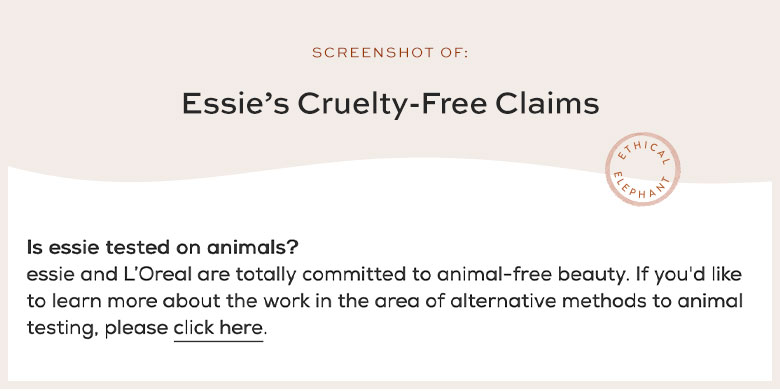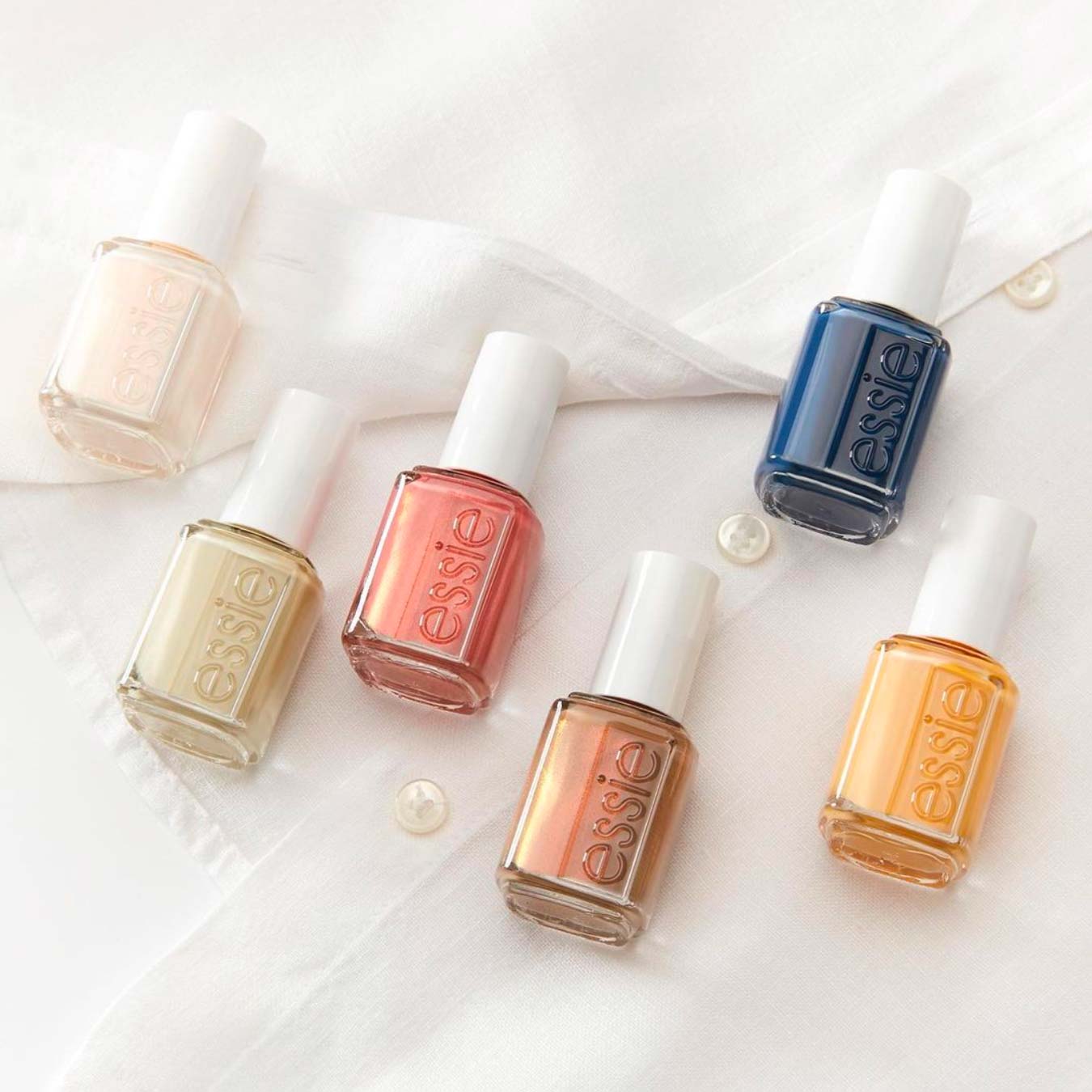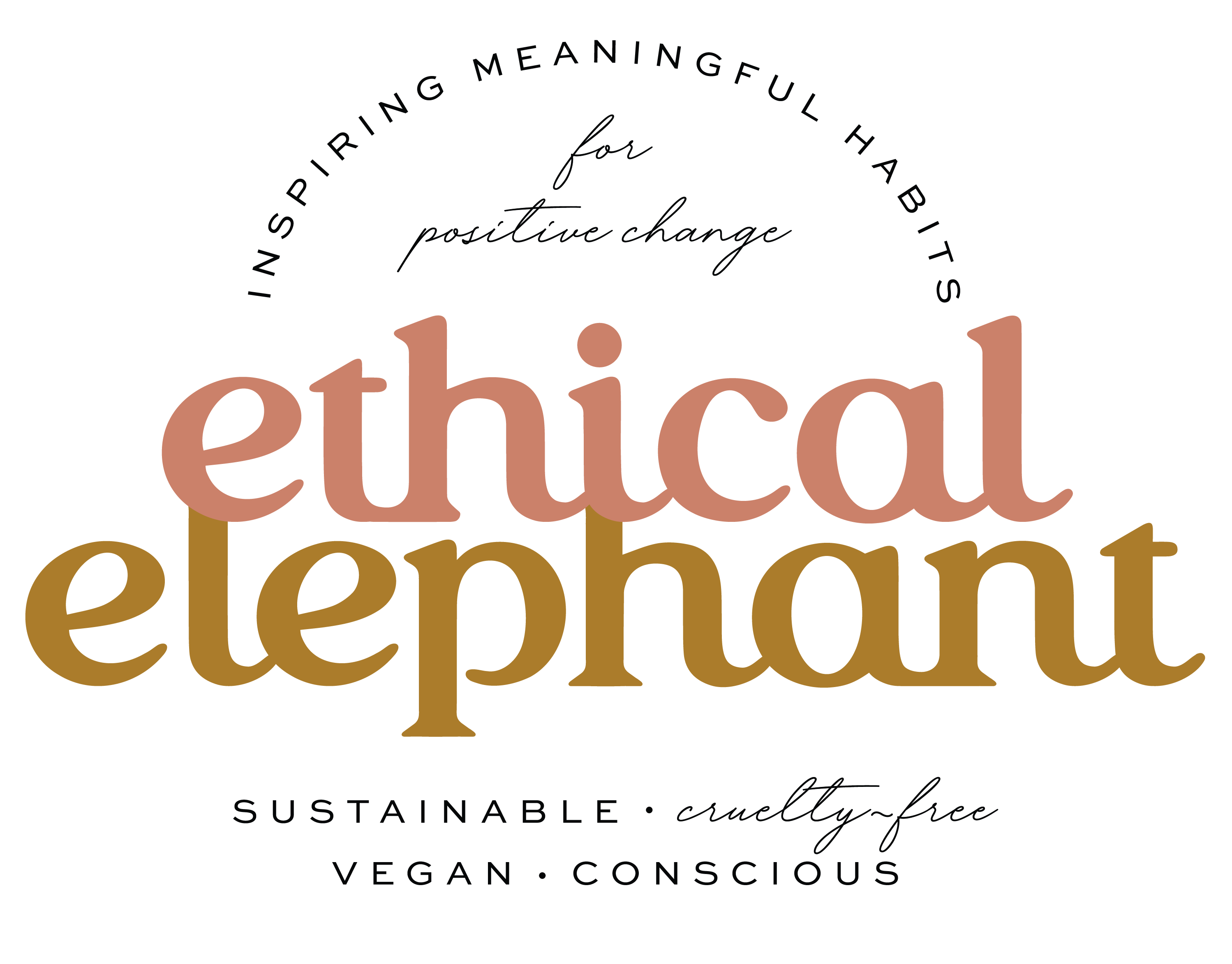This post may contain affiliate links that at no additional cost to you, I may earn a small commission.
Is Essie Cruelty-Free?
❓It is unclear whether Essie is truly cruelty-free or animal-tested. Therefore, Essie is listed as Grey Area – Brands with Unclear Policies.
To be a truly cruelty-free brand, companies must meet all of the following:
- Company does not test its products or ingredients on animals or ask others to test on its behalf
- Company can ensure none of its ingredient suppliers test on animals
- Company does not allow or sell its products under conditions where animal testing is required by law
Based on our research, Essie has not meet all of the above cruelty-free criteria. For those reasons, we are unable to classify Essie as a truly cruelty-free brand.
Learn more about our findings and why Essie’s cruelty-free policy is unclear below.
Essie’s Animal Testing Policy
When asking, does Essie test on animals? We must look beyond to ensure none of Essie’s ingredients or suppliers test on animals. And they don’t sell in any country or under conditions that may require animal testing by law.
To assess whether brands are cruelty-free, I always start with the company’s official animal testing policy on their website.
On Essie’s website, they claim that Essie and L’Oreal (its parent company) are committed to animal-free beauty. And then they provide a link to L’Oreal’s Corporate website.
See below for a screenshot of what’s currently stated on Essie’s website:

However, this is not enough information for us to classify Essie or any other brand as being cruelty-free to our standards.
So, I reached out to Essie to ask for more information about their animal testing policy. More specifically, I wanted to know if they commission or allow others to test, not just their finished products but their ingredients on animals, including when selling in countries that require animal testing (like mainland China).
And Essie responded by saying:
“Thank you for your interest in Essie a brand of The L’Oréal Group.
Our consumers’ health and safety have always been an absolute priority for L’Oréal.
As is the support of animal welfare.
L’Oréal has developed a very rigorous safety evaluation procedure of its products, backed by research. Well before the question of animal testing was raised by civil society or within a regulatory framework, L’Oréal has been committed to new methods of assessing safety that don’t involve animals. A true pioneer, L’Oréal has been reconstructing human skin models in laboratories to elaborate in vitro safety tests since 1979, as an alternative to animals. In 1989, L’Oréal completely ceased testing its products on animals, thus 14 years before the regulation required so. Today, L’Oréal no longer tests its ingredients on animals and no longer tolerates any exception to this rule.
Certain health authorities may nevertheless decide to conduct animal tests themselves for certain cosmetic products, as it is still the case in China. L’Oréal has been the most active company working alongside the Chinese authorities and scientists for over 10 years to have alternative testing methods recognized, and permit the cosmetic regulation to evolve towards a total and definite elimination of animal testing. Thanks to this, since 2014, certain products manufactured and sold in China like shampoo, body wash or make-up are no longer tested on animals.”
Based on Essie’s response, Essie has the same animal testing policy as L’Oreal where both state they make an exception to allow their products to be tested on animals where health authorities may decide to conduct animal tests for certain cosmetic products that they sell.
Truly cruelty-free brands will never allow their products or ingredients to be tested on animals. Cruelty-free companies have a policy where if the law requires them to test on animals then they will refuse to sell their products under those conditions.
For example, some imported cosmetics sold in stores in mainland China are required by Chinese laws to be tested on animals upon registration. Therefore, truly cruelty-free brands have chosen not to sell in China in order to remain committed to their no animal testing policy.
Is Essie Sold in China?
Essie told me in an email response that they do NOT sell in China.
Below is a snippet of the response I received from Essie:
“Please be advised essie products are not sold nor manufactured in China.”
When I asked Essie if they could clarify in what other cases do health authorities require their products to be tested on animals, the brand kept responding back with L’Oreal’s animal testing policy.
Because of Essie’s lack of transparency about their cruelty-free status and animal testing policy, I am unable to conclude whether Essie is a truly cruelty-free brand or one that tests on animals.
As a result, we are listing Essie in our Grey Area – Brands with Unclear Policies until they can provide more information about its animal testing policy.
Cruelty-Free Policies
Just because a brand claims they are ‘Cruelty-Free,’ doesn’t always mean that’s the case.
That’s because there is no legal definition for the label ‘Cruelty-Free.’ It can mean different things to different people. But Cruelty-Free is generally used to imply no animal testing. More specifically, the ingredients, formulation, or finished product are not tested on animals at any stage of product development.
At ethical elephant, we always assess a company’s cruelty-free policy using our Cruelty-Free Checklist. This ensures no animal testing was performed by the brand itself, its suppliers, or any third parties.
Is Essie Certified Cruelty-Free?
Essie is not certified cruelty-free by any third-party cruelty-free certifications like Leaping Bunny or PETA.
Since Essie is not certified cruelty-free by a third party, no one is substantiating or auditing Essie’s cruelty-free commitments and claims.
Is Essie Owned By A Non-Cruelty-Free Parent Company?
Yes. Essie is owned by L’Oreal, a parent corporation that still engages in animal testing in 2023.
Some cruelty-free consumers may choose to purchase and support cruelty-free brands owned by animal-tested parent corporations as they hope it will convince the parent company to become cruelty-free.
But in this case, Essie is NOT cruelty-free, and neither is its parent corporation, L’Oreal.
Does Essie Test on Animals?
Unfortunately, Essie failed to address all of our cruelty-free inquiries.
As a result, we cannot classify Essie as a truly cruelty-free brand until they are more transparent with their animal testing policy.
Currently, Essie is on our Grey Area Brands List – Brands with Unclear Policies.
Is Essie Vegan?
❌ Essie is NOT vegan. Essie claims to offer some “vegan” options that are free of animal-derived ingredients, but because Essie’s cruelty-free status is unclear, we wouldn’t consider anything sold or produced by Essie to be vegan at this time.
In order for products to be considered vegan by ethical elephant’s standards, the products and their ingredients must not be tested on animals anywhere in the world. Also, they must not contain any animal-derived ingredients or by-products.
Vegan Policies
Similar to ‘Cruelty-Free,’ there is no standard or legal definition for the label ‘Vegan.’ But Vegan is generally used to mean formulated without animal-derived ingredients or animal by-products.
Some common animal products in cosmetics include carmine, lanolin, snail mucus, beeswax, honey, pearl or silk-derived ingredients, animal-based glycerin, keratin, and squalene.
There are plant-based and synthetic alternatives to animal-derived ingredients. But unless a brand explicitly labels its ingredients or product as Vegan, it’s often difficult to know with certainty whether a product is vegan just by reading the ingredient list.
So it’s best to ask the company and manufacturers to ensure the ingredients they chose were from non-animal sources.
Cruelty-Free Alternatives to Essie
Looking to switch to cruelty-free brands? Here are some cruelty-free and vegan-friendly options that are similar to Essie:







